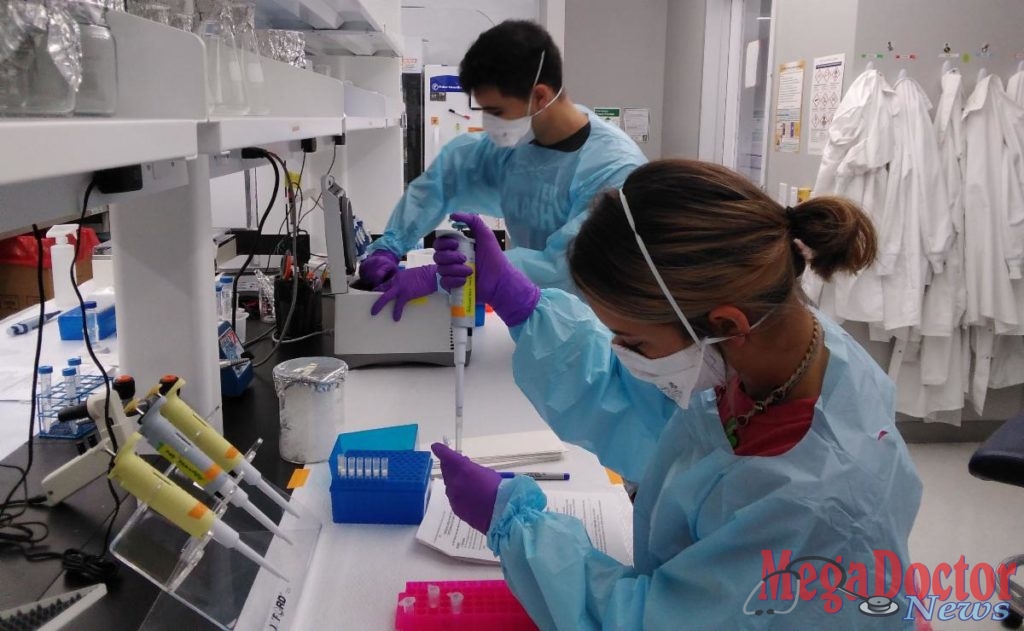
Mega Doctor News
By Maria Elena Hernandez
RIO GRANDE VALLEY, TEXAS – APRIL 6, 2020 – The UTRGV Center for Vector-Borne Disease is playing a key role in the Valley’s response to the COVID-19 pandemic.
The center – which normally focuses on viruses like Zika that are transmitted through insect or other arthropod bites – now is helping with COVID-19 testing, which the UTRGV School of Medicine’s clinical practice, UT Health RGV, started March 30 with testing sites in Brownsville and Edinburg.
“This was not something we expected to do,” said Dr. John Thomas, UTRGV assistant professor of biology and a founding member of the UTRGV Center for Vector-Borne Disease.
“The medical school called me a couple weeks ago and asked if I could help them prepare samples for shipment to an external diagnostic lab, so they could get tested for coronavirus. And that request somehow turned into, ‘Well, could you do the testing?’”
The Center for Vector-Borne Disease has an Applied Biosystems 7500 Fast Dx, a diagnostic machine that detects the Zika virus and other viral agents. The machine requires specialized training, and the center owns the only one south of San Antonio, Thomas said.
“We just made a few changes to our protocols and started doing COVID-19 testing,” he said.
Thomas set up teams to work on the two parts involved in the screenings – extracting the RNA and running the Applied Biosystems 7500 Fast Dx.
“The first part is actually extracting the coronavirus genetic material from the swab after it’s been placed in somebody’s nose,” Thomas said. “It’s a very complex process.”
He has seven highly trained graduate students working on that process.
“My graduate students, because we do so much work with Zika and dengue and other viruses… they’ve had a lot of practice already. They’ve already learned these skills from doing their graduate projects,” he said.
After verifying the purity and amount of RNA extracted, that team hands off the sample to the people running the Applied Biosystems 7500 Fast Dx.
Juan Garcia, a UTRGV graduate student from Edinburg majoring in biochemistry and molecular biology, is one of the people trained to use the machine. He manages the lab, and Thomas credits Garcia for directing the student teams.
“This is a once-in-a-lifetime opportunity to directly contribute to one of the most significant events in our lifetime affecting populations throughout the globe,” he said.
Garcia said the work is especially important since most of the students working in the lab are from the Rio Grande Valley.
“This allows Dr. Thomas’ lab to truly give back to the community during this time of concern and uncertainty,” he said.
Thomas said the switch to COVID-19 screening was a lot of work but potentially critical to the community.
“The sooner we can identify somebody as being positive for COVID-19, the faster we can intervene and lessen their opportunity to be able to infect other people,” Thomas said.
“We want to make sure our community is going to be safe and protected,” he said. “I don’t think anyone else but UTRGV and the UTRGV School of Medicine could have been in a position to come in and set up the system so quickly, and make it work for the Valley.”
The lab has been certified as a clinical lab (CLIA) through an emergency waiver approved by the state’s Health and Human Services Commission.
In the first week of testing, Thomas’ lab and UT Health RGV tested 338 people for COVID-19 across the two drive-thru sites, one in Edinburg and one in Brownsville.
People who feel they need to be tested for COVID-19 at UT Health RGV must first complete a mandatory phone screening by calling 1-833-UTRGVMD. UT Health RGV now offers the option to complete a form online to request a COVID-19 phone screening.
To learn more about the UTRGV Center for Vector-Borne Disease visit utrgv.edu/cvbd.








